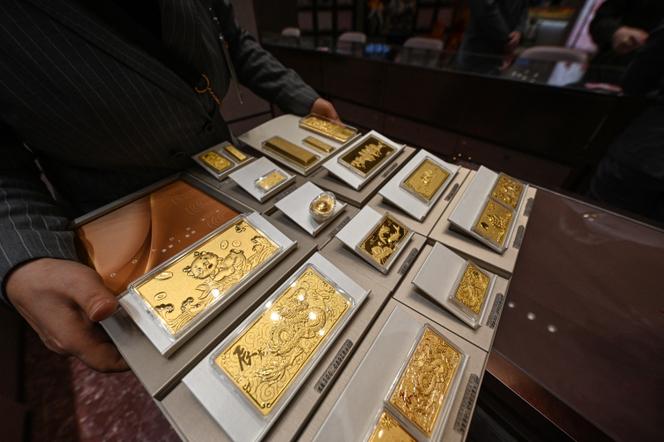
The Caibai store is a renowned jewelry store in the Chinese capital. “Since 1956,” reads a sign on the storefront, in the western part of Beijing. On the first floor, potential buyers looked at jewelry and objects set in gold. One floor is devoted to precious stones, another exclusively to jade. But it’s on the top floor that the most serious activity takes place, especially recently. As they reach the top of the escalators, customers are greeted by a large screen displaying a curve rising steadily in recent months: the price of gold per gram on the Shanghai market. On Monday, May 27, it was trading at around 550 yuan (nearly €70).
Here, people whisper. The customers are discreet and many of them have no great wealth, but modest savings. They take a long look before asking a question. Caibai offers all types of weights, from small coins of one to 30 grams featuring a panda, certified by the central bank, to ingots of 50, 100 or 300 grams. Bars engraved with Chinese astrological animals, including this year’s dragon, are a big hit. Under a display window, customers can slide their hand toward a large ingot to see if they can lift it.
A man asked the salesman if he could take a closer look at a small gold plate. He admitted to buying a few every year. “In the current context, it’s the safest way to invest money,” explained Lu, who didn’t give his full name. The seller, Wang Anmei, sees more and more customers like him.
A surge in consumption
At a time when the world’s second-largest economy is struggling to recover from several years of pandemic and a real estate market in crisis, gold remains the safe haven par excellence. “It’s reliable. People think it’s the best investment. There was also real estate and the stock market, but today people are hesitant, whereas gold has continued to rise,” explained Wang. Gold consumption in China rose by 6% in the first quarter, following a 9% increase in 2023.
For the Chinese, whose currency is only partially convertible, it is difficult to move funds to invest abroad. Local stock markets proved unstable, experiencing a worrisome fall and fluctuation for small investors in 2023, until a massive intervention by state investors stabilized prices at the end of January 2024, just before the Lunar New Year.
Property prices, in particular, have yet to stabilize. The sector accounted for 70% of household wealth, a market long considered low-risk as the country continued to urbanize. Yet investment in real estate fell by a further 9.8% year-on-year in the first four months of 2024.
You have 46.21% of this article left to read. The rest is for subscribers only.